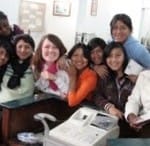Studies show that underserved teens will drop out of high school earlier than others, and that those students who drop out commit about 75 percent of crimes. Studies also show a close link between students who drop out and poverty, drug and alcohol use, teen pregnancy and gang involvement.* Just 54 percent of immigrant undocumented youth have a high school diploma, compared to 82 percent of their U.S.-born peers. Only 5 to 10 percent of graduates continue their education and enroll in an institution of higher education, and fewer graduate with a degree.* We provide support through information and guidance to students who have been living in fear and despair for most of their lives. This support gives them tangible hope. Students call them “little family meetings.” We provide a safe confidential space where youth share and engage with their peers in a school-based support system. We accompany students on a personal and relational level through chaotic circumstances, unexpected problems and difficult situations with no easy solutions. Our students count on our commitment to them through high school and beyond. We connect students to critical resources such as legal aid, financial aid for college, transportation, letters of recommendation, housing and many other resources SWOL has served hundreds of underserved immigrant youth, and received volumes of letters and positive feedback from school staff and students. Why are we always asked to return to schools? *Sources for statistics include Smiley, Travis. “Fact Sheet: Is the Dropout Problem Real?.” Travis Smiley Reports. Accessed February 26, 2014; Southwest Regional Laboratory, “1994 Survey of Alcohol and Other Drug Use, and Other Problems Among California Dropouts;” Perez, Zenen Jaimes. “Removing Barriers to Higher Education for Undocumented Students.” Center for American Progress: 2014; Passel, Jeffrey S. and D’Vera Cohn. “A Portrait of Unauthorized Immigrants in the United States.” Pew Research Hispanic Trends Project, 2009; “National Institutions Coming Out Day Toolkit: Institutional Policies and Programs with & for Undocumented Students.” United We Dream, 2015; Edwin Rubenstein. “The Economic Case for a Moratorium on Immigration.” The Social Contract Journal, 2011.The Risk Factors

Children Afflicted by Risk Factors face Harsh Futures

Prospects are More Daunting for Immigrant Youth
The Stats

Information and Guidance

A Caring Confidential Place to Share

Personal and Long-Term Support

Connection to Resources
Why Does the SWOL Program Work So Well?
We have a genuine love and dedication for marginalized students
We foster a trusting, family atmosphere within our student groups
SWOL’S founder and program facilitator is an attorney and former underserved youth
SWOL’s workshops are known for their energetic positivity that gives students hope and raises self-esteem
Information and resources are conveniently brought to students within their schools
Students are provided with an easy-to-remember method for addressing issues
SWOL is a grassroots organization that offers quality, personal support with big impact
SWOL’s goal is to treat the whole person, as opposed to one aspect of students’ lives
